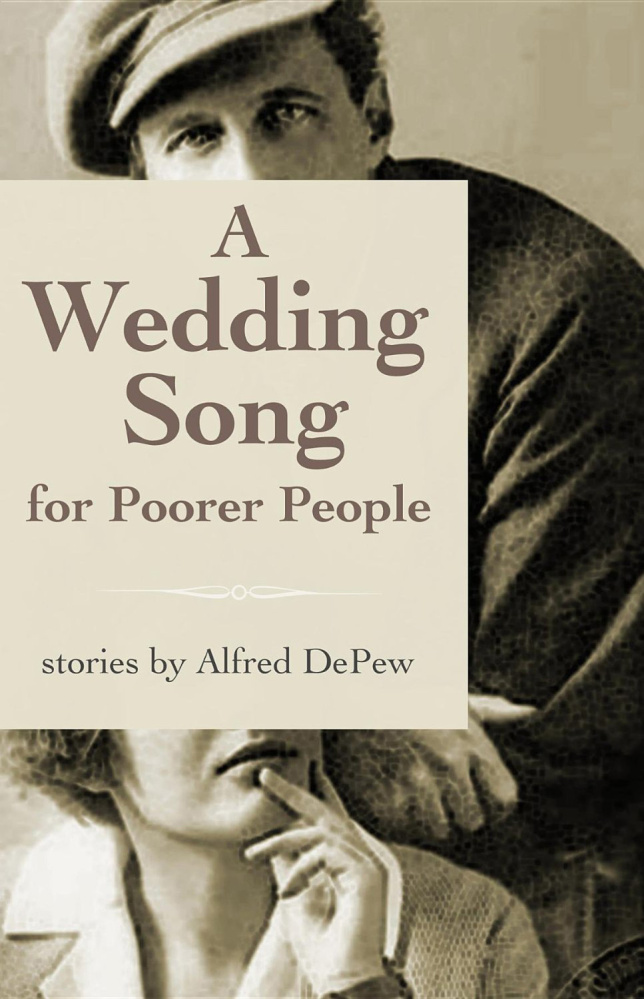“A Wedding Song for Poorer People: Stories”
By Alfred DePew
Mixed Messages Press, St. Louis, Missouri, 2015
256 pages, paperback, $22.95
“A Wedding Song for Poorer People” is the title not only of Alfred DePew’s new collection of short fiction and a story in the collection, but also of a song in Bertolt Brecht’s quirky play of the 1920s, “The Threepenny Opera.”
In DePew’s story, a group of mostly British theater people have put together a troupe for a brief tour of Eastern Europe, soon after the fall of the communist governments. They’re offering what the organizers think is a fresh version of “Threepenny Opera,” one of Brecht’s many works critical of the corruptions of capitalism. Brecht himself was a Marxist who along the way got kicked out of Nazi Germany.
Nothing goes right for the troupe. The show in Prague encounters mixups. The train breaks down on the trip to Russia. There are all kinds of shenanigans in the Russian hotel (exact Balkan counterparts of which I have experienced myself). One of the members finds herself entangled in a sudden friendship with a British journalist investigating organized crime, or not. Tempers among the tight-knit group start to fray. One of the Russian assistants pretends to be gay, sparking up an affair with probably the most chaste of the men in the troupe, and then tries to peddle it in a blackmail scheme to an official in charge of prosecuting homosexuality.
The first night of the play, the theater is completely empty. They perform anyway, and after the last scene they notice a lone charwoman standing in the back, who turns out to have once been a celebrated Russian actress. And she reveals the cultural confusion that’s really taking place: “Thieves, prostitutes, murderers! We should come to the theater to see them? When that’s all we see on our way to work, when shopping . . . ?”
The director, Molly, an American, tries to explain the intent is to provoke a discussion of old problems in a new time, and the charwoman-actress replies: “‘It’s an old joke. . . . Under capitalism, man exploits his fellow man. Under Communism, it’s the other way around.'”
So one of the themes of this story — and the whole book, really — is the nature of confusion. The troupe is confused about their purpose. The friends are confusing each other. Their sexuality gets confusing. And the story culminates in massive, hilarious, poignant confusion. Bertolt Brecht might have loved it.
In the book’s other long piece, “La Casita,” different kinds of disarray in a 21st century American artists’ scene also stoke the plot. Roger, a painter in late middle age, retreats from the university teaching job he’s being booted out of, to his wealthy benefactor’s home in Santa Fe, where love, business, aesthetic and administrative affairs collide through strikingly realistic dissembling, cynicism and innocence.
“La Casita,” “A Wedding Song for Poorer People” and indeed all five stories in the book skillfully knit distinct plot tensions and diverse, vividly made characters — including dialogue as sharp as anything in contemporary fiction. This book knocked me out, something I do not get to say very often.. It’s easy to see how DePew’s first collection, “The Melancholy of Departure,” won the Flannery O’Connor Award for Short Fiction in 1992. If you have a taste, or a knowledgeable distaste for the fiction that tends to turn up in The New Yorker, there’s a good chance you’ll be deeply engaged by “A Wedding Song for Poorer People.” This is the real thing.
Alfred DePew lives in Vancouver, where he is a columnist and a consultant in leadership development. Before that, he lived for years in Portland, where he taught at the Maine College of Art and made sojourns to Deer Isle to teach at the Haystack Mountain School of Crafts. “A Wedding Song for Poorer People” is available through bookstores and online from Mixed Messages Press.
Off Radar takes note of books with Maine connections about twice a month in the Kennebec Journal and Morning Sentinel’s What’s Happening? Contact Dana Wilde at universe@dwildepress.net.
Send questions/comments to the editors.



Success. Please wait for the page to reload. If the page does not reload within 5 seconds, please refresh the page.
Enter your email and password to access comments.
Hi, to comment on stories you must . This profile is in addition to your subscription and website login.
Already have a commenting profile? .
Invalid username/password.
Please check your email to confirm and complete your registration.
Only subscribers are eligible to post comments. Please subscribe or login first for digital access. Here’s why.
Use the form below to reset your password. When you've submitted your account email, we will send an email with a reset code.